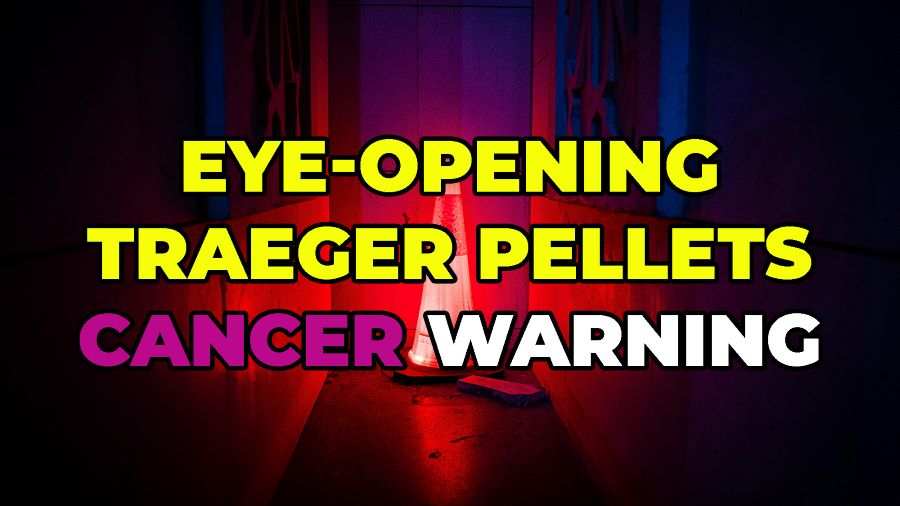If you’ve noticed the Traeger pellets cancer warning label or heard whispers about it online, you’re not alone. Let’s talk about what that warning really means, why it’s there, and whether your next BBQ should come with a side of worry.
Imagine this—your backyard smells like smoky BBQ, your Traeger grill is fired up, and the sound of sizzling meat is music to your ears. You’re relaxed, hungry, and ready to feast. Then, your friend casually says, “Hey, did you know Traeger pellets come with a cancer warning?”
Talk about a mood killer, right?
What Is the Traeger Pellets Cancer Warning Really About?
So, let’s get this out of the way: seeing a warning label on something you cook with can feel scary. Especially when it’s a Proposition 65 warning, which you’ll often find on Traeger pellet bags.

Proposition 65, or Prop 65, is a California law that requires businesses to warn consumers if a product contains any chemicals known to cause cancer, birth defects, or reproductive harm. This law covers 900+ substances and applies even if a product contains just a tiny trace of any of them.
Traeger’s warning isn’t because their pellets are stuffed with toxic junk. It’s mostly about wood dust, which naturally occurs during the manufacturing of wood pellets. According to the California Office of Environmental Health Hazard Assessment (OEHHA), breathing in too much wood dust over a long time can lead to respiratory problems and is classified as a potential cancer risk.
Traeger includes the label to comply with Prop 65. Not because their pellets are dangerous for casual grilling.
Do wood pellets cause cancer?
Do wood pellets cause cancer? Not directly—but the smoke produced when wood pellets are burned can contain substances that are classified as carcinogens. This includes compounds like polycyclic aromatic hydrocarbons (PAHs) and formaldehyde, which are byproducts of combustion found in many types of high-heat cooking, not just pellet grilling. The risk is not unique to wood pellets; it’s a general concern with grilling or smoking foods at high temperatures. To minimize any potential health risks, it’s important to use food-grade pellets, ensure good ventilation, avoid over-charring food, and maintain a clean grill. When used properly, wood pellets are considered a safe and effective fuel for cooking.
Traeger pellets cancer warning signs
Do Traeger Pellets Actually Cause Cancer?
Let’s answer the big question clearly: no, there is no strong evidence showing that using Traeger pellets for cooking causes cancer in humans when used properly.

But here’s the nuance. When wood burns (even clean, natural hardwood), it releases smoke particles, including polycyclic aromatic hydrocarbons (PAHs) and volatile organic compounds (VOCs). These compounds have been studied in lab tests, and high levels of PAHs have shown cancer links in animals.
Does that mean your weekend BBQ is putting your life at risk? Not really.
We’re talking about long-term, high-level exposure, not the casual grilling most people do on weekends or holidays. Even cooking food on a gas or charcoal grill can release these compounds.
If you’re using your Traeger smoker once or twice a week and doing it in a well-ventilated area, your risk is considered very low.
Are Traeger Pellets Toxic or Safe to Use?
Here’s the good news: Traeger pellets are made from 100% pure hardwood, with no additives, binders, or artificial flavors. No glue, no weird chemicals—just wood compressed into small, dense pellets.
Some folks get confused because they see a weird color or a white or blue film on the inside of their grill after cooking. That’s usually from natural food-grade soybean oil or smoke residue, not something toxic.
Now, that doesn’t mean all wood pellets are created equal. If you’re tempted by a discount pack at your local hardware store, be cautious. Some non-branded or knock-off pellets might include fillers, bark, or binders, and those can release chemicals when burned.
So the answer to “are Traeger pellets toxic?” is a confident no, if you’re sticking to their official pellets and following basic grilling safety.
Why Is There a Cancer Warning on So Many Things?
This might surprise you—but it’s not just Traeger pellets that carry these labels.
You’ll find Proposition 65 warnings on:
-
Alcohol (yes, your favorite wine!)
-
Cigarettes
-
Coffee (due to acrylamide)
-
Splenda
-
Roasted potatoes and toast
-
Some household cleaners
-
Even parking garages due to car exhaust
So when you see a Traeger pellets cancer warning on alcohol or coffee, it doesn’t mean those products are deadly. It just means California wants consumers to be informed—even about tiny, trace amounts of potentially risky substances.
It’s more about transparency than danger.
How to Grill Safely with Traeger Pellets
If you’re someone who likes to be cautious—and let’s face it, many of us are—you can still enjoy your Traeger grill while minimizing any potential risks.

Here’s how:
1. Grill in Open Spaces
Never use your pellet grill indoors or in enclosed garages. Always grill in a well-ventilated area, like your backyard or balcony.
2. Clean Your Grill Often
Built-up residue can hold onto smoke particles and release more VOCs. Wipe it down, scrape the grates, and empty the ash after each cookout.
3. Avoid Over-Smoking
More smoke doesn’t always mean better flavor. Excessive smoke can increase the chance of PAHs landing on your food. Let your grill do the work slowly and naturally.
4. Trim Fatty Meats
Fat drips onto hot surfaces and causes flare-ups, which can add more smoke. Trim extra fat before cooking.
5. Choose Lighter Smoke Woods
Some hardwoods, like mesquite, burn hotter and smokier. Traeger pellets in apple, cherry, or maple produce less smoke and are still delicious.
Do Wood Pellets Cause Cancer? Breaking It Down Simply
If you’re still wondering, “Do wood pellets cause cancer?”, the short answer is: There’s no strong evidence for casual use.
When people burn a lot of wood (think factories or old wood stoves in winter), they breathe in more particulates, which raises health risks. But using a Traeger smoker for ribs on Sunday? That’s not in the same ballpark.
If anything, grilling with wood pellets might be cleaner than charcoal, which can reach higher temps and release more chemicals when meat drips onto open flames.
In short, moderation and good habits make a big difference.
Real Talk: Traeger Pellets Cancer Warning
Let’s cut through the noise. The Traeger pellets cancer warning isn’t a sign that your grill is poisoning you—it’s a result of California’s Proposition 65, which requires companies to label products that may expose users to even trace amounts of chemicals linked to cancer. In the case of Traeger pellets, the warning mostly applies to smoke byproducts that form when wood burns—things like PAHs and carbon monoxide—which are common in all grilling methods, from charcoal to propane.
Here’s the deal: if you’re using food-grade pellets, cooking in a well-ventilated area, and not burning your food to a crisp, the risk is minimal. This isn’t about avoiding grilling—it’s about being aware, grilling smarter, and not panicking over a label designed to cover a wide legal net. So yes, read the warning, but don’t let it ruin your next backyard BBQ. Grill on—responsibly.”
FAQ’s
Q1. What is the cancer warning on Traeger pellets about?
It’s a California Prop 65 label that warns consumers about wood dust—a byproduct from the pellet-making process that’s considered a potential cancer risk with long-term exposure.
Q2. Are Traeger pellets toxic?
No. Traeger pellets are made from 100% pure hardwood with no fillers or chemicals. They’re safe when used properly.
Q3. Do wood pellets cause cancer?
Not in everyday grilling. The warning exists due to trace levels of chemicals in wood smoke, but occasional use isn’t linked to serious risk.
Q4. Why is there a cancer warning on alcohol and coffee too?
Because California law requires it. These products may contain small amounts of chemicals like acrylamide or ethanol that have shown risks in lab tests.
Q5. Can I still use my Traeger grill safely?
Absolutely. Use it outdoors, keep it clean, and avoid burning your food. That’s really all you need to do.
Final Thoughts
Grilling is about more than just food—it’s about sharing good times, great meals, and warm moments with the people you love. While the Traeger pellets cancer warning might sound alarming at first, it’s really just part of California’s strict labeling laws designed to promote transparency.
By choosing high-quality, clean pellets, ensuring proper ventilation, and grilling responsibly, there’s no reason you can’t enjoy that smoky brisket or perfectly seared salmon with peace of mind.
So go ahead—fire up the Traeger, invite your friends, and enjoy the experience. The Traeger pellets cancer warning is a reminder to be informed, not afraid. Let the good times (and good food) roll.

